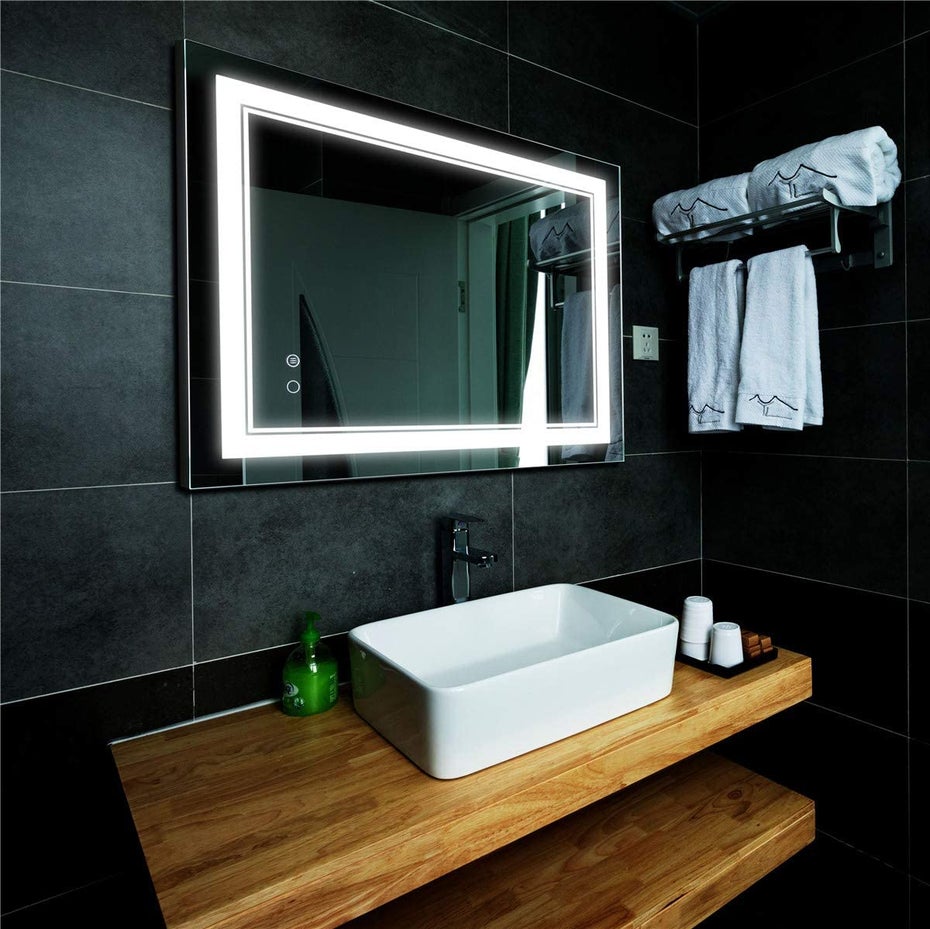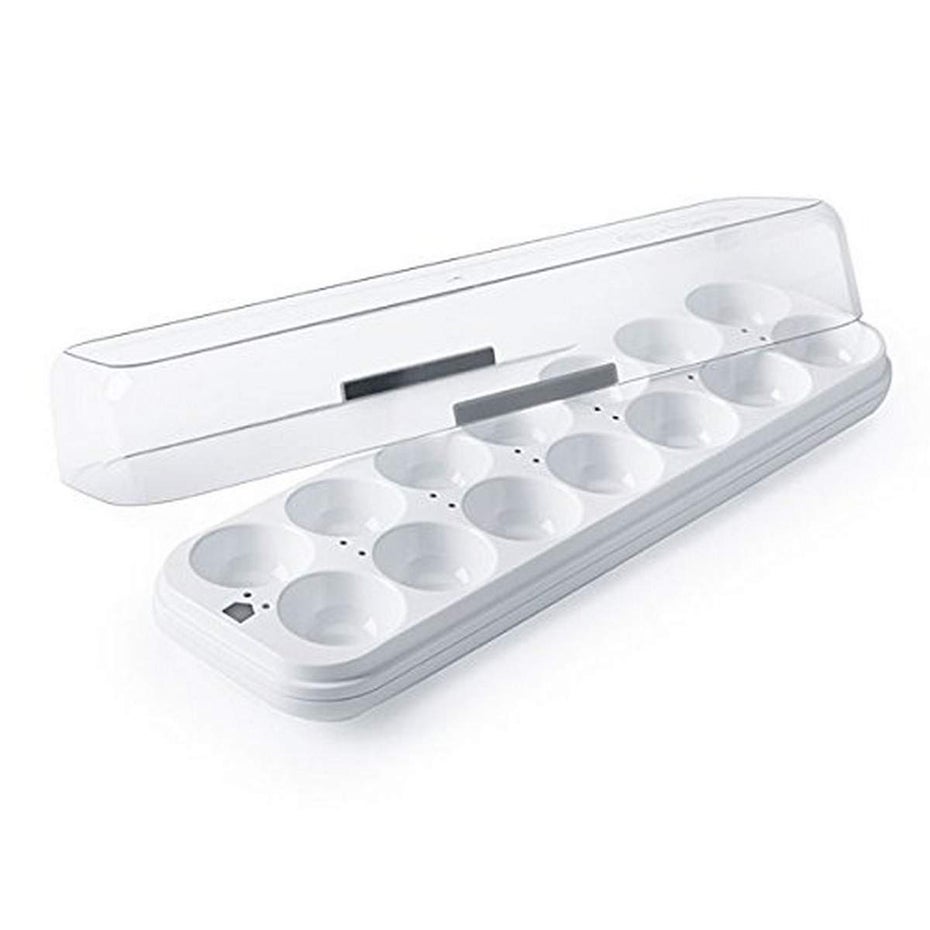9 Pointless Smart Gadgets That Would Really Be Better Off Stupid
Just have a quick toast for breakfast in the morning? There is a lot more potential in this device, the manufacturer of the smart toaster must have thought. Accordingly, the product that for just under $320 is also advertised on Amazon: the toaster is “a breathtaking conversation starter on any worktop,” it says, for example. For those who don’t want to start a conversation on their worktop, the device is still “fun” because: “Intuitive touchscreen, countdown clock and happy finish gong add a little joy to toasting.”
Bread seems to be the wrong option here (product image: Revolution Cooking).
Finally Internet in the cup: That’s what the Ember Mug² promises. The cup can be charged on the accompanying saucer, which is admittedly quite smart, and then allows the temperature of the drink to be regulated via smartphone. However, there is another important difference to conventional containers for drinks: the smart cup costs almost 150 euros. Another tip for drinking coffee or tea smartly: Spread your little finger when you start the cup!

Finally full control over your own crockery. (Product image: Ember)
If you think about which household item should ideally not collect any data about its use, you will probably quickly end up with the toilet. But that’s over now: the era of smart toilets has begun, headlines the Guardian, for example. Basically, a toilet that analyzes what lands in it and can thus draw attention to health or nutritional problems at an early stage is not a bad idea. The problem, as with many smart devices, is what happens to the data. And do you really want that? The fact that the smart toilet would sooner or later appear in hospitals was already known in the medical sitcom Scrubs in 2007.
At Amazon, numerous smart mirrors are currently out of stock. Whether this is due to excessive demand, a lack of interest or even the general lack of chips can only be guessed at. In fact, the mirrors make a reservedly futuristic impression and give you the feeling of living in a science fiction film even during your morning routine. However, if they only show the time, weather and date, that’s nothing that a look at the cell phone wouldn’t have done in the same amount of time and at a much lower cost.

There are now many smart mirrors. However, the big boom did not materialize. (Product image: cool2day/Amazon)
Editor’s Recommendations
The world’s first smart waste bin: that was the goal of the Qube Kickstarter Campaignabout which, among other things Wired reports. For a trash can, artificial intelligence doesn’t necessarily seem like a blessing, but humans didn’t seem to have much interest in the “innovative technology” either. In the end, the campaign ended up at 3,580 euros. The goal, however, was 240,000 euros.
A solar-powered trash can that helps with recycling doesn’t seem like a bad idea at first. However, why the bucket has to track how often you use it and what movements take place in the area is less obvious. Smart trash cans remain an idea for the bin for the time being.
By the way, you can find real Smarthome tips here:
Do you often ask yourself how many eggs are actually left in the fridge? Well, that problem is soon solved because, as the Quriky Egg Minder product description states, “You’ll never look for a good egg again.” Around 15 US dollars will be for it due at Amazon. Other features: LED lights that highlight the oldest egg with a special color and push notifications that warn you when the egg supply is running low.

Warning: the eggs are empty! (Product image: Quirky/ Amazon)
Sex life is becoming more and more digital, so sex toys are also becoming smarter. However, the whole thing becomes problematic if the associated apps, data transmission or the devices themselves are not sufficiently secured. Back in 2016, we reported on a smart vibrator that became a tool for hackers. However, there are some other toys that make it all too easy for hackers, such as among others smarthomeassistant.de reported. Also reports of ransomeware attacks increased last.
Finally eat less? The smart fork Hapifork wants to make that possible. For example, the cutlery tracks the eating speed: How long did the meal last in total, how many bites per minute were consumed and how much time is between two bites? In addition to the fork itself, the Hapifork mobile app for iOS or Android is also required. You have to digest that first.
But malice is not always appropriate when it comes to cutlery with additional functions. The Gyenno Spoon, for example, is a spoon that effectively helps Parkinson’s patients eat by counter-rotating to compensate for any shaking movements. So, smart devices are often about accessibility, and what might seem superfluous to one person can make life a lot easier for another.
Wine connoisseurs value many different metrics in order to achieve the best pleasurable experience when tasting a fine drop. So it’s no wonder that resourceful business people came up with the idea of bringing a whole lot of technology into play. However, everyone has to decide for themselves whether drinking alcohol should be particularly “smart” in principle. But how about a Wi-Fi wine bottle, for example? It works as a cover for a regular wine bottle and can then indicate, among other things, how many glasses of wine are left in the now covered bottle. Impressive:
If the smart wine bottle is not enough for you, you can also go to grab a smart wine decanter for around $30.
The telephone is probably the object whose “smartening” has had the greatest impact on our everyday lives. But there can always be moments when being permanently connected becomes too much for us. If that’s the case for you, take a look here: The coolest dumbphones for more peace in your pocket.


